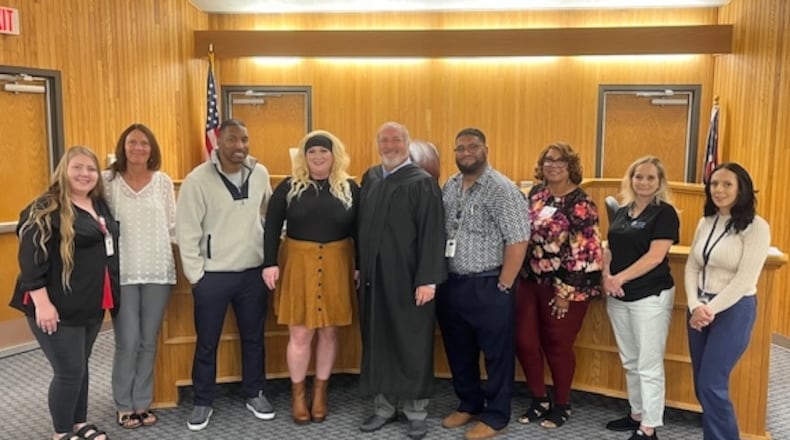“It’s an honor truly to have the opportunity to have experienced the Drug Court, and being the first to graduate is just a plus,” Beechler said.
Drug Court director Traci Sullivan said the mission is to help substance-dependent offenders by providing a court-managed drug treatment and mentoring program that “eliminates barriers to sobriety, aids in developing a sober lifestyle and reduces recidivism.”
The court consists of four phases over an 18 to 24-month period, though the probationary period can be extended up to five years.
“(It) employs the carrot and the stick model — compliance is incentivized by verbal praise by the judge and team, certificates, gift card necessities and diminished court fines,” Sullivan said. “Poor decisions and outcomes result in negative consequences such as increased reporting to probation, assignments, community service or implementation of some or all of their suspended jail time.”
Beechler said she went through the program to protect her integrity because of her numerous incarcerations due to alcoholism. She said this program has helped her stay on a more productive and positive track of sobriety, because each phase of the program came with new challenges that kept her successful and on the right path.
“I was at an all time low. If it weren’t for the Drug Court starting and me being the first to ever join, I wouldn’t have known the compassion of Judge Carey’s court. I was given a second chance to progressively better my life,” she said.
Most of the participants enter the program from jail because they are given an opportunity to enter a drug and alcohol facility directly from jail before their entire sentence is served, leaving suspended time, Sullivan said.
Participants must be Clark County residents with a Municipal Court case or sentence involving or motived by substance use. Sullivan said people in that group are “at higher risk to reoffend and be unsuccessful on regular probation.”
Almost all participants are also dual-diagnosed, which Sullivan said means along with a substance use diagnosis, most also have a mental health diagnosis.
“Many participants struggle with mental health issues, unstable housing, health concerns, family issues, lack of education and employment. We try to address all of those issues and develop a pattern of good decision-making,” she said.
Sullivan said the program and court is “so proud” of Beechler, who said the program has taught her many things. One thing that she will carry close to her from her experience is accountability and honesty.
“Walking in my faith has kept me going, but the hope and positive feedback that I received from the judge and just the caring heart, he has kept me hopeful that this program really works,” Beechler said. “The person that it’s helped me become is someone that I can truly be proud of. Before I felt lost, hopeless and fearful of the future, while today I live there and it’s everything and more that I could’ve hoped for ... I made it through and I couldn’t be more proud of myself. There is a light at the end of the tunnel.”
Beechler encourages anyone who is struggling to get sober or who needs extra support to try out the program for themselves.
For her next steps, Beechler said she plans to continue on the path of sobriety and with her education in real estate. She earned her real estate certificate and attends Clark State College for her real estate brokers certificate that she will earn in the fall of next year.
“My life is full of positivity and great people. I live and lead a very happy life today,” she said.
The Drug Court team is made up of two jail rehabilitation specialists, area drug and alcohol providers who provide or link with mental health services, McKinley Hall, Sunrise, Brightview, Ethan’s Crossing Full Circle, Emerge, Mercy Reach, Citilookout for trauma and anger counseling opportunities for those with disabilities to help with job placement, the DRUG Court judge and director/probation officer.
About the Author


